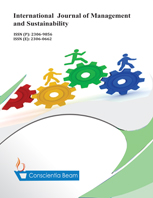Widening the Breadth of Knowledge Diffusion among Nigerian Employees: The Upsides of Globalization
DOI:
https://doi.org/10.18488/journal.11/2013.2.6/11.6.113.126Abstract
Many scholars from the developing world argue that globalization is a weapon of imperialism used to perpetuate the income and welfare gap between developing and developed countries. This study joins an emerging stream of studies calling for a holistic re-examination of the impact of globalization on developing countries to understand both the positive and negative contributions instead of have a one-sided view of globalization. Employing a quantitative design with a survey strategy, data for this study was collected from 130 human resources personnel across six multinational firms spanning: oil, banking, and manufacturing sectors of the Nigerian economy. Inferential analysis of collected data found significant positive contributions of globalization towards personnel training and development. In particular, findings show that globalization has increased the frequency and methods of trainings, increased use of e-trainings and certifications, and uniform design of training programmes across the subsidiaries of MNCs globally. All these were found to reduce the physical incidence of personnel going abroad to study reducing both brain-drain and expenses to domestic companies and governments.

